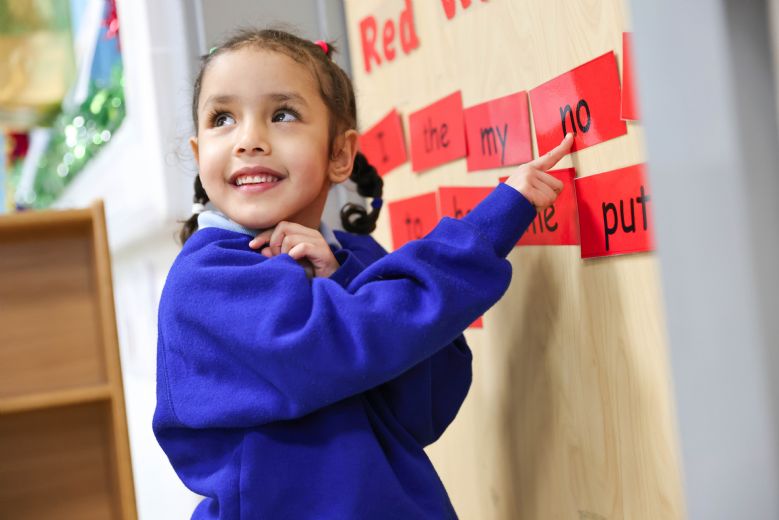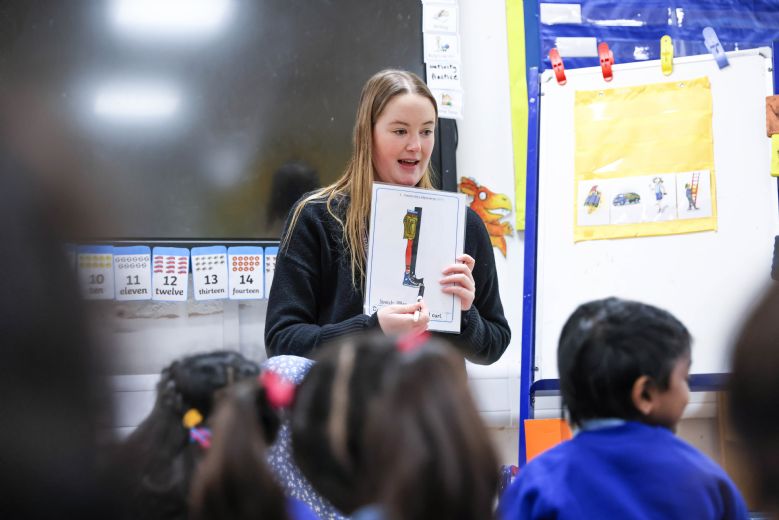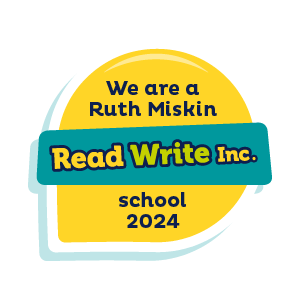Phonics / Reading



Vision
To develop confident readers who can comprehend a wide variety of texts through obtaining a rich knowledge of vocabulary which will enable them to further enhance their opportunities later in life.
Phonics
 At Roxbourne Primary School, we have adopted the Read Write Inc phonics programme. The Read Write Inc programme (RWI) is a Department of Education-validated phonics programme for primary schools. It is a high-impact phonics programme that transforms reading and writing for every child. The programme is designed for pupils aged 4-7. However, at Roxbourne we begin the programme in the final term of Nursery and we continue teaching RWInc to pupils aged 7 after which, once reading with fluency and good comprehension, pupils are taught the school’s Reading curriculum.
At Roxbourne Primary School, we have adopted the Read Write Inc phonics programme. The Read Write Inc programme (RWI) is a Department of Education-validated phonics programme for primary schools. It is a high-impact phonics programme that transforms reading and writing for every child. The programme is designed for pupils aged 4-7. However, at Roxbourne we begin the programme in the final term of Nursery and we continue teaching RWInc to pupils aged 7 after which, once reading with fluency and good comprehension, pupils are taught the school’s Reading curriculum.
The National Curriculum ensures that all pupils are taught Phonics systematically. This gives your child the tools to read any word. At Roxbourne, pupils attend daily structured lessons taught by trained phonics staff with consistent expectations across the range of abilities. Our pupils start by learning to read and write sounds. All words are made up of these individual sounds. As part of the phonics curriculum, pupils learn 44 sounds and the corresponding letters/letter groups using simple picture prompts. They learn to read words using blending these sounds together. e.g. in ‘mat’ we have the sounds ‘m’, ‘a’, ‘t’, ship – ‘sh’, ‘i’, ‘p’. Pupils practise reading and spelling words containing these sounds. Once they are able to blend sounds together they are given decodable books containing sounds and words they can read. Our pupils also learn to spell the words they have been reading and develop their ideas into sentences so that they can write about the Storybooks they read. To practise skills learnt at school, all pupils take home a 'Book Bag Book' which is specifically pitched to both consolidate learning and provide a challenge in an engaging and fun way! To build pupils' love for reading, they read lively stories featuring words they have learnt to sound out after a meaningful discussion led by an adult whereby pupils show that they comprehend the stories by answering questions. Reading for pleasure is integral to the development of children's reading and therefore, all classes have daily timetabled story-time where adults read stories to our pupils: stories they cannot yet read for themselves.
Each half-term, we assess how each pupil is getting on with their phonics learning in order to ensure that they are grouped in the most supportive way possible. This ensures that they are able to succeed whilst being challenged at the appropriate level. Some pupils are assessed more than once a half-term, depending on their group and progress.
Whole Class Reading
Curriculum Design: How our curriculum is constructed and why?
We maintain a structured and constantly evolving approach to the teaching of reading through our whole class teaching model. Our methodology is underpinned by contemporary research and continues to develop ensuring our reading curriculum is always strong. Each year group has a curriculum map which lists a variety of non-fiction extracts which are linked to their Humanities topic as well as a variety of fiction extracts linked to the five plagues of a developing reader (archaic, non-linear, complexity of narrator, complexity of plot, and resistant texts) Our weekly teaching is routinely focussed on both the explicit and implicit teaching of vocabulary, discussing and analysing texts, establishing meaning and analysing meaning through retrieval and inference. Doing this allows pupils to use reading as a basis to expand their knowledge in other areas of the curriculum, i.e. using newly learnt words in Writing and further enhancing their knowledge of the Humanities topic. Furthermore, providing them with the knowledge to maximise their intellectual profit gained from enrichment trips. Vocabulary is a focus due to both the short-term need in order to be able to establish the meaning of a text, but also with a longer-term vision of learning approximately 50,000 words before university (which research suggests is necessary).
Our explicit teaching of retrieval and inference is key as we believe these are skills not only relevant for reading but also for most, if not all social day-to-day scenarios one encounters. Pupils should progress year to year throughout their education. Progression from year to year is reflected by:
- The complexity of the text in terms of vocabulary
- The levelling of the text as per the Lexile levelling system
- The maturity of the theme of the text
- The length of the text
Although we focus on extracts during our teaching, we also recognise the importance of reading whole texts and novels. Each day, the class teacher will end the day by reading a carefully selected story book as part of our reading for pleasure culture. This has the aim of exposing pupils to wider texts of different subject matter and writing styles, allowing them to develop their own independent reading taste and preference of author, genre and writing style.
Curriculum Delivery: What our curriculum looks and feels like in action?
Once pupils have completed the phonics programme they receive a weekly taught curriculum which focuses on specifically chosen non-fiction extracts of a high quality linked to their current Humanities unit and fiction extracts which cover a range of diversity and classics from our literary heritage. The curriculum is adapted as per the variety of texts based on our Humanities curriculum. Through our focus on diversity, our pupils are exposed to authors from different backgrounds in both culture and neuro-diversity. In turn, we have a substantial number of books on record written about characters of different races, religions, physical and neurological backgrounds as well as texts reflecting alternative family structure.
The lesson structure focuses on specific knowledge and skills being taught each day. During the week, pupils will be explicitly taught between three and six new words relevant to the text before being given the chance to develop their retrieval and inference skills. Children alo have an opportunity to develop their oracy skills through deep discussion on what they are reading with a focus on literary themes and author’s writing style. On the first day of each week, pupils will hear the text read with fluency. Thereafter, on each day, the text will be reread as a class with the opportunity to pause for discussion and to establish meaning before moving on to analyse the meaning. During this reading, teachers will briefly pause to implicitly teach other words not previously known. These chosen extracts vary from extracts from stories to diary entries, poems and other genres of writing, including non-fiction (pupils are additionally exposed to non-fiction during the teaching of foundation subjects).
Monday
- Three news words taught explicitly
- Apply newly learnt words to different contexts
- Listen to the extract read fluently.
Tuesday
- Three new words taught explicitly (if applicable)
- Pupils' read the extract as a class
- Deep discussion on theme/symbolism/figurative language of the text
- Annotation of the text.
Wednesday
- Recap on vocabulary
- Pupils' read the extract as a class
- Establish and analyse meaning
- Domain focused independently based around retrieval.
Thursday and Friday
- Recap on vocabulary
- Class read extract with fluency
- Domain focused on independent tasks based on inference.
Reading is a subject that is prevalent throughout our school and is celebrated frequently. Every class has their own display containing the key taught vocabulary, reading domains and a picture of their current text. We also have a whole school library which celebrates reading for pleasure and is accessible to pupils during lunchtime. This provides a space for pupils to access high quality texts which are banded, linked to their reading age, which is derived from Accelerated Reader. Furthermore, those pupils who regularly access the library and engage in Accelerated Reader are celebrated in the library with our most prevalent readers being rewarded with a book from our reading vending machine!
Impact: How do we know our pupils are learning, understanding and remembering our intended curriculum?
We establish pupils' understanding of what has been taught through both summative and formative assessment.
The formative assessment will consist of:
- Questioning
- Over the shoulder marking
- Fluency of reading
- Weekly homework
- Quality of texts in reading record
As part of the summative assessment, pupils' reading levels are established through a half-term assessment on Accelerated Reader which provides them with a coloured band depending on their score. Pupils are then able to loan books out from our school library as per their level. Once they have completed the book, they then complete a quiz on Accelerated Reader which further allows them to practice their retrieval and inference skills. Additional summative assessment:
- Accelerated Reader Star Test
- PIRA termly assessment
- SATs tests
Enrichment in Reading
At Roxbourne we enrich our pupils through Reading by having a rich selection of high-quality texts available to read. Throughout the year we also hold book fairs which allow pupils to purchase books independently for pleasure. During the year we invite an author to come in and visit the pupils to talk about their writing process and sign books for the pupils with the aim of promoting reading for pleasure. We also celebrate success on Accelerated Reader by rewarding pupils with tokens from the vending machine which allow them to choose a book that they are then able to keep.